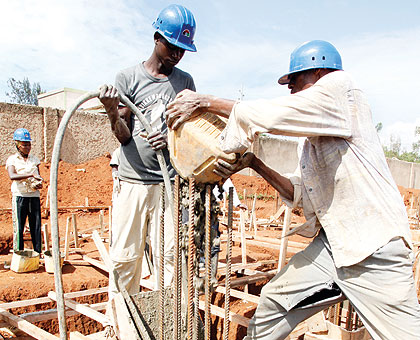Real estate developers may have reason to smile after government, through Rwanda Development Board, is looking into how to reduce the time it takes to acquire a construction permit.


Real estate developers may have reason to smile after government, through Rwanda Development Board, is looking into how to reduce the time it takes to acquire a construction permit.In Kigali city, before one embarks on a construction project, they are required to get a permit from the city council.According to the City client’s charter, the application should last 30 days, however, the process is tedious and may take longer, frustrating developers."It is our priority this year and we want to have a very big cut in terms of the time it takes and the procedures involved in attaining construction permits,” Clare Akamanzi, RDB’s acting CEO said in an interview with The New Times.The president for the Real Estate Association of Rwanda (REAR), Charles Haba, argued that the problem with construction permits is mainly due to the pending Kigali City master plans, whereby city authorities are hesitant to issue out construction permits before the completion of the master plans."The process to acquire a detailed and elaborate master plan is quite long because they must align it with other projects such as with the Rwanda Environment National Authority, which is redesigning the country’s wetland marks,” Haba said."As real estate developers we are of course frustrated because application for construction permits delays; but we only have to be patient because when the designs and master plans are complete, the delay will stop.”According to Kigali City Council, the master plans for all the three districts will be completed by the end of the year.Haba also argued that the authority that grants construction permits should be decentralized in order to make the exercise less bureaucratic."KCC needs to decentralize some of its power to district authorities; this will make the process for acquiring construction permits much easier and faster for practitioners,” he said.While real estate development in the country faces other complex challenges such as financing, the issue of construction permits was reflected in last year’s World Bank Doing Business Report – Rwanda dropped seven places in dealing with construction permits, from 90th to 98th, according to the report."It doesn’t mean that we didn’t do reforms, we did, but World Bank says that the reforms were not that much felt on the ground. So we will ensure to make the reforms more operational on ground. We had a joint meeting with the mayors and with the ministry of infrastructure and discussed several strategies; so it’s a priority of all the players to ensure that construction permits procedures are streamlined,”Akamanzi said.She added that, Rwanda still remains very competitive when it comes to the overall ease of doing business, whereby it added two key reforms in the recent report- getting electricity and enforcing contracts."In the 2013 doing business report, Rwanda is ranked 52nd worldwide, 3rd in Sub Saharan Africa and the easiest place to do business in East Africa. The report also gave an analysis of the most reformed economies in the period of eight years between 2005 and 2012, in which Rwanda is recognized as the second most reformed economy after Georgia. So, overall Rwanda has been very consistent and competitive in the area of doing business,” the acting CEO noted.Akamanzi said that the country’s target is to attain a top 30 global position in the ease of doing business, although she acknowledged that the journey is still massive with challenges still existing in the provision of affordable infrastructure, electricity and the automation of business services.Being a landlocked country, trading across borders is a significant area that will blossom Rwanda’s business climate according to Akamanzi, although she believes that Rwanda is dependent on its neighbors’ rate of business reform."How quickly we export and import and the cost of trading across borders requires regional effort because our competitiveness is highly dependent on the performance of the northern and eastern corridor,”Events last month saw Port Mombasa temporarily shut down due to a workers strike, bringing a long standstill to the loading and offloading of goods.Although the situation was later quelled, it significantly paralyzed business in East Africa."Obviously as a land locked country you must rely on a port from another country, this is something we are completely not in control of. The good thing for us is that we have two options in Mombasa and Dar es Salaam. It is improbable to find both of them having problems, so we will always have a route for exports and imports,” Akamanzi added.Rwanda’s ranking per indicator remained strong in such as opening a business, where it remained eighth easiest in the world.Company registration requires only two procedures and the whole process of incorporation is concluded within six hours.


